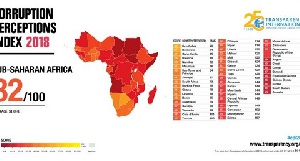 Ghana ranked 78 out of 180 countries
Ghana ranked 78 out of 180 countries
Ghana has ranked 78 out of 180 countries on the 2018 global Corruption Perception Index (CPI), according to Transparency International (TI).
According to the report, in 2018, Ghana scored 41 out of a possible clean score of 100, with the score showing that Ghana’s performance had improved by one point from its 2017 score of 40.
Ghana Integrity Initiative (GII), a local chapter of TI, released the report yesterday in Accra, with an observation that “this score is a positive departure from the continuous drop the country has been experiencing since the year 2015.”
According to the report, several factors including policies and initiatives by the ruling New Patriotic Party (NPP) government and state institutions implemented during the period under consideration could have accounted for this improvement.
It stated that “the enhanced performance of the Audit Service and the Auditor General in discharging their constitutional mandate and ensuring the protection of the public purse could have made some impact on the 2018 CPI score.”
Again, it said “the paperless port clearing system under the Digital Inclusive Agenda and the establishment of the Office of the Special Prosecutor to fight corruption and corruption related offences in spite of teething challenges could have equally impacted on Ghana’s 2018 CPI score.”
The report underscored that the ongoing Judicial Service reforms including efforts to promote high standards of integrity amongst judges and magistrates, and judicial staff, and e-justice system cannot also go unmentioned.
“These linkages being made are important as they correlate to some of the indicators experts assessed. For instance, some of the surveys used to compute the 2018 CPI focused on the extent to which the Executive can be held accountable for its use of funds; the extent to which public employees within the Executive are required to account for the use of resources, administrative decisions, and results obtained,” it said.
Managing Director of TI Patricia Moreira was quoted in the report as saying “with many democratic institutions under threat across the globe – often by leaders with authoritarian or populist tendencies – we need to do more to strengthen checks and balances and protect citizens’ rights.”
In order to make real progress against corruption and strengthen democracy around the world, TI has called on governments to among other things, strengthen the institutions responsible for maintaining checks and balances over political actors, and ensure their ability to operate without intimidation; close the implementation gap between anti-corruption legislation, practice and enforcement; support civil society organizations which enhance political engagement and public oversight over government spending, particularly at the local level.
Recommendations
Meanwhile, Ghana’s performance notwithstanding, GII indicated that the country could have possibly scored higher if allegations of corruption during the period under review were expeditiously investigated, prosecuted and the appropriate sanctions meted out to culprits.
GII has therefore recommended that government must take a critical look at elements that promote public sector corruption including patronage, nepotism, secret political party financing, suspiciously close ties between politics and business, among others, and work to minimize them if not completely eradicate them from the Ghanaian society.
It also called on the Ghanaian Parliament “as a matter of urgency to ensure the passage of the Right to Information Bill and the Conduct of Public Officer’s Bill into laws as they are very critical in promoting transparency and public sector integrity necessary for the fight against corruption.”